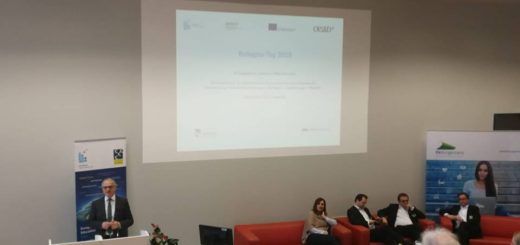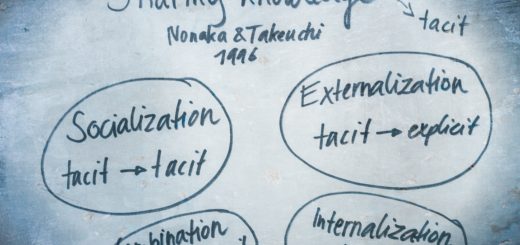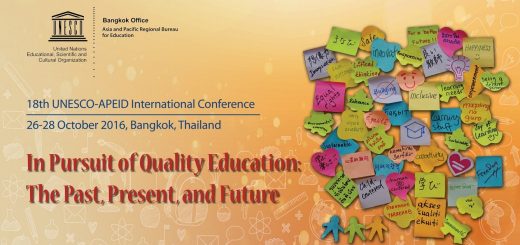Conference “Education is Relation not Output?”
Peter Baumgartner and I held a workshop “Is tacit knowledge communicable” at the Conference “Education is Relation not Output? – Scenes of Knowledge and Knowledge Acquisition”, from 17th-19th of May 2016 at Linnaeus University in Växjö, Sweden. Below you find the workshop slides, the abstract and the conference programme.
Workshop Slides
Abstract
Is tacit knowledge communicable?
Peter Baumgartner & Isabel Grundschober
In this paper we will present some ideas how informal learning can be communicated. Within today’s fast changing society, most of our competences predominantly result from a continuous and on-going process of experiential learning at our workplace and other day-to-day activities. So-called expert knowledge is not acquired or constructed in the short time span during our formal or non-formal learning career (school, study) but during activities where we try to find solutions to challenges. Therefore, this kind of knowledge is not the outcome of arrangements that are particularly oriented to the intention of learning, but is a spin-off or side effect of intrinsically meaningful actions for all persons actively involved in these situations. This leads to the problem, that learners are often unaware of the significance, the depth or variety of their informal learning.
But how can we judge this kind of personal knowledge in a reproducible and comparable way? We need a theoretically sound procedure for validation of informal learning. Validation of informal learning plays an important role when it comes to lifelong learning, as informal learning through the people’s professional, social and personal lives needs to be recognised. Successfully implemented validation procedures could act as the missing link between informal workplace learning and formal education and training.
In the first part of this article we will outline some characteristics of informal learning. We hypothesise that the results of informal learning can be described by the Polanyian term of “tacit knowledge” and that it cannot be represented completely in a linguistic way. In the second part of this contribution we will present some ideas by Christopher Alexander, proposing that his theory of a “pattern language” could be used as a methodological device to make tacit knowledge visible and to communicate it. In the third and last part of this paper we will draw some conclusion for the design of a validation procedure for informal learning. As a continuing example we use our own professional experience of teacher training to illustrate the significance and practical implementation of our considerations. Each part addressed above contains two sections: One section, dedicated to theoretical aspects and another section, focussing on practical implications. This way, we try to picture the problem and our conclusions more holistically and practicably.
Conference Programme
Read through the conference programme below:
Tuesday, the 17th of May
11.00-13.00 Registration
12.00-13.00 Lunch
13.00-13.20 Welcome
13.20-14.00 Keynote speaker Siarhei Piashkun (Belarus)
14.00-15.30 Session 1 Globalization, Interculturality and Interdependence
Workshop 1: Is intercultural pedagogy possible? Identifying and overcoming intellectual barriers to intercultural education in the interface of epistemology and aesthetic learning (Feiwel Kupferberg, Katarina Elam, Margareta Wallin Victorin, Rasoul Nejadmehr, Tarja Karlsson Häikiö, Marie-Louise Hansson Stenhammar, Scandinavia)
Workshop 2: Cooperative Learning within Educational Networks: Perspectives for Good Educational Governance and Public Value (Gudrun Marci-B., Germany)
Workshop 3: Values and Knowledge Education (VaKE) – a Didactic Tool to Teach Humanism and Democracy (Jean-Luc Patry, Austria)
Workshop 4: Openness in Education: Claims, Concepts, and Perspectives for Higher Education (Theo Hug; Austria)
15.30-16.00 Coffee Break
16:00-16.40 Keynote speaker Nanna Lueth (Germany)
16:40-18:10 Session 2: Diversity and Gender
Workshop 1: Staging Gender: the Articulation of Tacit Gender Dimensions in Drama Classes in a Swedish Context (Anna Lund, Sweden)
Workshop 2: Mermaiding – Body-Styling and Practices in Textile-Esthetical Processes of Education (Anne-Marie Grundmeier & Maud Hietzge, Germany)
Workshop 3: “Gender” as a form of “Tacit” knowing in the fields of Pedagogy (Anja Kraus, Sweden)
Workshop 4: Cultural Ethnic Diversity and Gender in the School Patio (Stela M. Ferrarese, Argentina)
18.10-19.30 Break –
19.30 Dinner at a restaurant in town
Wednesday, the 18th of May
8.00-12.00 Hospitations at schools
12.00-13.00 Break
13.00-14.00 Lunch
14.00-14.40 Keynote speaker Tatiana Shchyttsova (Lithuania)
14:40-16:10 Session 3: Humanism and Democracy
Workshop 1: Being and Becoming: A phenomenological perspective on formative dimensions of preschool education (Eva Schwarz, Lotte Alsterdahl, Maria Pröckl & Beatriz Lindvist, Sweden)
Workshop 2: Is Tacit Knowledge Communicable? (Peter Baumgartner & Isabell Grundschober, Austria)
Workshop 3: A Concept Analysis of Critical Thinking in the Framework of Critical Pedagogy in Teacher Education (Fatma Saçlı Uzunoz; Turkey)
Workshop 4: Never change a running system – but what if the system leads in the wrong direction? Is there any way to promote change and innovation against all odds? (Barbara Vollmer & Sibylle Rahm, Germany)
16.10-16.30 Coffee Break
16.30-17.30 Round table discussion: Prof. Stephen Hwang (LNU, Theoretical Physics), Dr. Bärbel Westphal (LNU, Germanistics), Prof. Theo Hug (Innsbruck, Educational Sc.), Prof. Peter Baumgartner (Wien, Educational Sc.), Prof. Maria Peters (Bremen, Art Education), Prof. Feiwel Kupferberg (Copenhagen, Cultural Sc.)
17.30-18.00 Break
18.00 Dinner at Växjö Teleborg Castle
Thursday, the 19th of May
8.30-9.10 Keynote Norm Friesen (Canada)
9:10-10.40 Session 3/1: Art, Visual Culture and Media
Workshop 1: Things that matter. Acquiring Knowledge through Self-Organized Artistic and Cultural Activities (Hanne Seitz, Germany)
Workshop 2: The Field of Tension of Media-Related Visual Cultures and the Demands of School (Anja Kraus, Sweden)
Workshop 3: Media and Cultural Education. A Means to Social Cohesion in a Global World (Michael Waltinger, Sweden)
Workshop 4: Media abstinence – why less can be more (Anna Aloisia Moser, Germany/USA)
10.40-11.20 Keynote Matthias Rath (Germany)
11.20-12.20 Lunch
12.20-13.50 Session 3/2: Art, Visual Culture and Media
Workshop 1: Baobab Children Foundation (Birgit Buchholz, Germany)
Workshop 2: Photography as Encounter – Reflective Potentials of Photographic Approaches to Pedagogic Processes (Katja Böhme, Germany)
Workshop 3: Learning is Practice not Output. Camera-Ethnography as an Approach to Learning (Bina Mohn, Germany)
Workshop 4: Performance and Competence: Visual Knowledge Productions in the Artistic Research Learning Process. Results from Project CU FaBiT (Maria Peters + Christina Inthoff, Germany)
13.50-14.50 Round Table: Maria Peters, Antje Majewski and others
15:00-17.00 Coffee and Events


